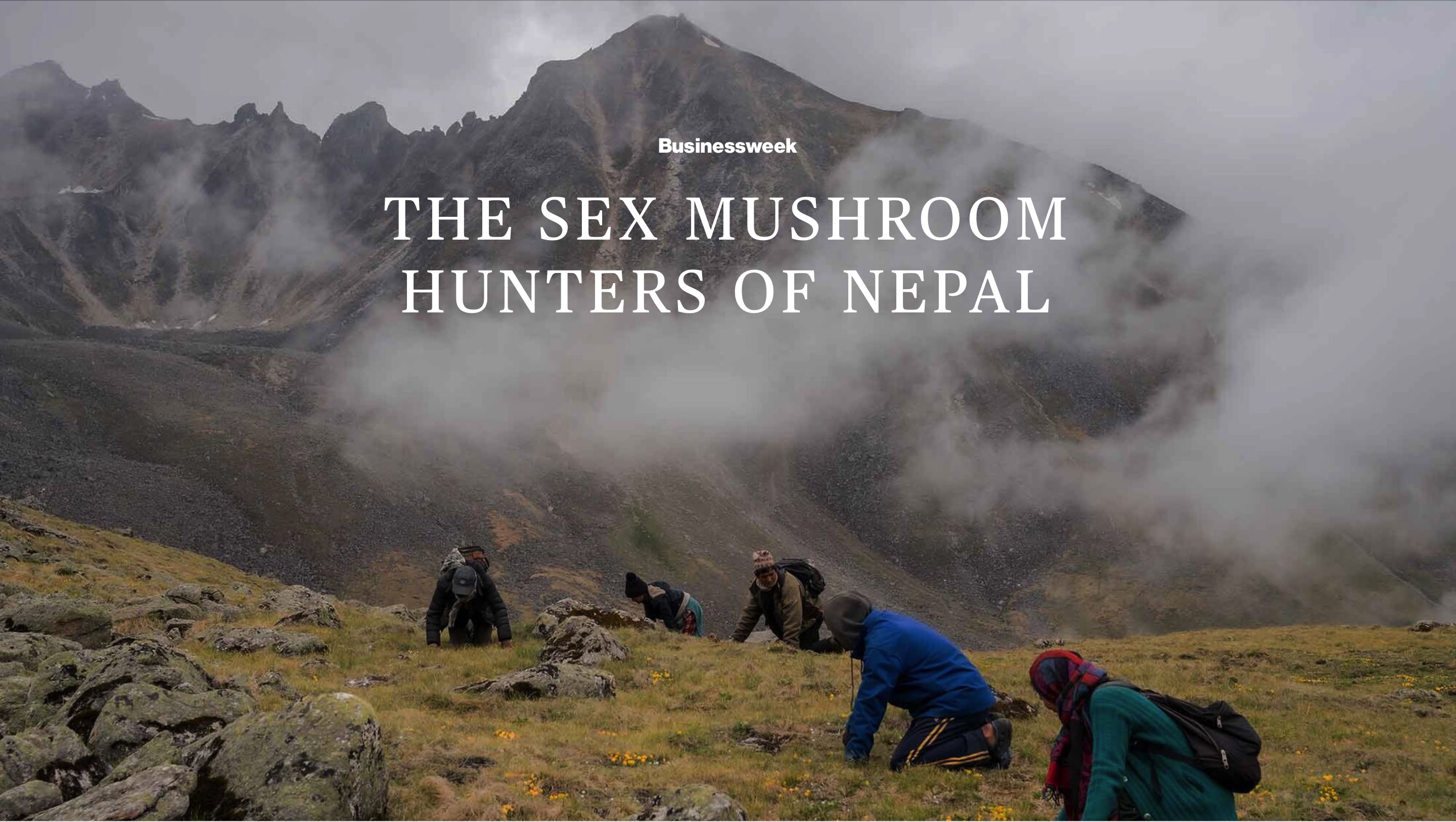Bloomberg’s Special Report on Nepal: The Nepali Hunters in Search of the 'Sex Mushroom'

The American financial media Bloomberg has published a special report on the collection of the highly valuable Cordyceps Sinensis (Yarsagumba) found in Nepal’s high Himalayan regions. The report explores the associated risks, economic impact, and scientific and social perspectives of this trade. Written by Adam Popescu, the report features stunning photographs captured by Purnima Shrestha.
The ‘Himalayan Viagra’ Trade in Nepal’s Mountains
According to the report, Yarsagumba, found in the high-altitude regions of Nepal, China, India, and Bhutan, is widely used in traditional medicine. This fungus grows from the corpse of a dead caterpillar and is believed to enhance sexual health, boost physical energy, and help with heart disease and other health issues. Over the years, the trade of this highly sought-after ‘Himalayan Viagra’ has flourished.
Nepali Families Earning Thousands of Dollars but Facing Extreme Risks
The report highlights that people from remote Himalayan regions like Mugu, Humla, and Dolpa trek up to 15,000 feeteach year to harvest Yarsagumba. Farmers like Janak Aidi and his wife, Mangali Bohara, earn thousands of dollars from the trade, but in recent years, prices have dropped.
However, this profession comes with extreme risks. The number of people dying while collecting Yarsagumba in Nepal has now surpassed the number of climbers dying on Mount Everest, the report states.
How Does the Yarsagumba Trade Work?
Bloomberg's report reveals that Kathmandu’s Thamel, Pokhara, and other major business hubs have become hotspots for the Yarsagumba trade. The report quotes K.C. Bastola, a merchant in Thamel, who explains, “Wealthy Chinese customers come here because they highly value our Himalayan medicine.”
In Kathmandu’s markets, one gram of Yarsagumba is sold for approximately NPR 800 (USD 9), whereas in Beijing, the price reaches up to USD 136,000 per pound.
Growing Child Labor and Crime: The Dalai Lama Expresses Concern
The report highlights how the uncontrolled Yarsagumba trade has led to an increase in child labor, violence, and social unrest.
- Child Labor: In many Himalayan villages in Nepal, schools shut down each spring, and children are sent to collect Yarsagumba. The report features 9-year-old Birendra Rawat, who spends entire days searching for the fungus on his hands and knees.
- Violence & Crime: The Dalai Lama has criticized the Yarsagumba trade, calling it a crisis for Buddhist culture, as it has led to crime and violence. The Himalayan regions have seen gang fights, robberies, and even murders related to the trade.
- Smuggling to China: The report states that Chinese traders smuggle Yarsagumba across the Nepal-China border, purchasing it at a low price in Nepal and selling it for massive profits in China.
Scientific Studies: Does Yarsagumba Actually Improve Sexual Health?
Bloomberg has also included insights from scientific researchers:
- Some studies suggest that Yarsagumba may help with heart disease, blood pressure regulation, and immunity boosting, but there is no solid scientific proof that it enhances sexual performance.
- Stanford University researchers estimate the global Yarsagumba market to be worth $11 billion.
- University of California scientist Tawni Tidwell states, “Many people believe Yarsagumba enhances sexual performance, but this is not scientifically proven.”
Political Concerns: MP Rajendra Bajgain Calls for Border Regulations
The report quotes Nepali Member of Parliament Rajendra Bajgain, who has expressed concerns about illegal Yarsagumba smuggling and the lack of strict government regulations.
Bajgain stated, “If Nepal’s government does not take policy-level action, this trade will fall into the hands of criminal groups. The border security must be strengthened to regulate the Yarsagumba trade.”
Why Did Bloomberg Highlight Nepal?
Bloomberg has given Nepal special importance by focusing on the livelihoods of people in the Himalayan region, their economic struggles, and Nepal’s significant role in the global traditional medicine trade.
- Nepal is a major source of Yarsagumba, contributing significantly to the rural economy.
- Bloomberg has highlighted the struggles, challenges, and economic opportunities of Nepal’s Himalayan communities on an international platform.
- Journalist Adam Popescu and photographer Purnima Shrestha have provided in-depth reporting and compelling images that bring Nepal’s mountain life to global attention.
Opportunities and Challenges for Nepal
The Yarsagumba trade provides an economic opportunity for Nepal, but unregulated harvesting poses risks to the environment, social stability, and international smuggling.
The Nepalese government must implement proper policies to regulate Yarsagumba harvesting, ensure environmental protection, enforce legal controls, and safeguard the interests of local communities, as Bloomberg’s report has pointed out.




![From Kathmandu to the World: How Excel Students Are Winning Big [Admission Open]](https://nepalaaja.com/img/70194/medium/excel-college-info-eng-nep-2342.jpg)
